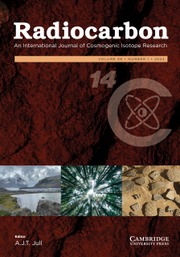Article contents
ROUTINE QUALITY ASSURANCE IN THE SUERC RADIOCARBON LABORATORY
Published online by Cambridge University Press: 06 July 2023
Abstract
The SUERC Radiocarbon Laboratory reports approximately 3000 unknown samples per year with an additional 1200 samples processed for quality assurance purposes. In addition to the primary OxII standard (SRM-4990C) required for AMS batch normalization, secondary “known-age” standards have been used over many years to evaluate individual batch quality. These have included wood (as prepared alpha-cellulose), barley mash, humic acid, a background mammoth bone, known-age bones, and a whisky sample. In this paper, we present some of the results gathered over routine laboratory operation (for more than 10 years) and examine the results illustrating how they are being used to monitor and quality assure performance. Since many of these samples have also been used in the Glasgow intercomparisons, we will also reflect on the results, as well as the actual and potential uses of such samples.
Information
- Type
- Conference Paper
- Information
- Radiocarbon , Volume 66 , Issue 5: 24th Radiocarbon and 10th 14C & Archaeology, Zurich, Sept. 11–16, 2022 Proceedings Part 1 of 2 , October 2024 , pp. 1395 - 1405
- Copyright
- © The Author(s), 2023. Published by Cambridge University Press on behalf of University of Arizona
Footnotes
Selected Papers from the 24th Radiocarbon and 10th Radiocarbon & Archaeology International Conferences, Zurich, Switzerland, 11–16 Sept. 2022
References
REFERENCES
- 1
- Cited by


